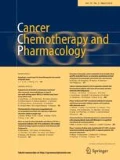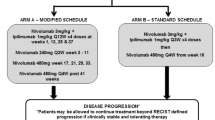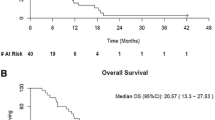Abstract
Background
Fluoropyrimidine based therapy has modest activity in patients with metastatic renal carcinoma and inhibition of ribonucleotide reductase is synergistic in model systems. GTI-2040 is a 20-mer phosphorothioate oligonucleotide complimentary to the R2 component of ribonucleotide reductase that has activity in renal cancer models.
Methods
Metastatic renal carcinoma patients without prior fluoropyrimidine therapy and normal organ function were treated with oral capecitabine 880 mg/m2 twice daily along with continuous infusion GTI-2040 starting at 148 mg/m2/day for 21 days, for each 28-day cycle. After completion of the phase I portion, the phase II study portion sought to rule out a null hypothesized 10% response rate versus an alternative 25% response rate utilizing α and β errors of 0.05 and 0.2, respectively. GTI-2040 pharmacokinetics and effects on ribonucleotide reductase expression in peripheral mononuclear cells were evaluated in a subset of patients.
Results
Based on one dose limiting toxicity in nine patients in the phase I portion, the phase II portion was conducted using the previously recommended 185 mg/m2/day dose of GTI-2040. Twenty-six patients were enrolled in the phase II portion to obtain 18 fully evaluable for response. Only one patient, treated at a GTI 2040 dose of 185 mg/m2/day in the phase I portion of the protocol, responded. Toxicities and GTI-2040 pharmacokinetics were consistent with previously reported results. R2 expression in peripheral mononuclear cells was too variable for accurate interpretation.
Conclusion
Further study of GTI-2040 and capecitabine in metastatic renal cancer at this dose and schedule is not indicated. Further study is necessary to determine whether lack of activity is due to inadequate target inhibition or inadequate effect of appropriate targeting.

Similar content being viewed by others
References
Escudier B, Eisen T, Stadler WM, Szczylik C, Oudard S, Siebels M, Negrier S, Chevreau C, Solska E, Desai AA, Rolland F, Demkow T, Hutson TE, Gore M, Freeman S, Schwartz B, Shan M, Simantov R, Bukowski RM (2007) Sorafenib in advanced clear-cell renal-cell carcinoma. N Engl J Med 356:125–134
Motzer R J, Hutson TE, Tomczak P, Michaelson MD, Bukowski RM, Rixe O, Oudard S, Negrier S, Szczylik C, Kim ST, Chen I, Bycott PW, Baum CM, Figlin RA (2007) Sunitinib versus interferon alfa in metastatic renal-cell carcinoma. N Engl J Med 356:115–124
Fyfe G, Fisher RI, Rosenberg SA, Sznol M, Parkinson DR, Louie AC (1995) Results of treatment of 255 patients with metastatic renal cell carcinoma who received high-dose recombinant interleukin-2 therapy. J Clin Oncol 13:688–696
McDermott DF, Regan MM, Clark JI, Flaherty LE, Weiss GR, Logan TF, Kirkwood JM, Gordon MS, Sosman JA, Ernstoff MS, Tretter CP, Urba WJ, Smith JW, Margolin KA, Mier JW, Gollob JA, Dutcher JP, Atkins MB (2005) Randomized phase III trial of high-dose interleukin-2 versus subcutaneous interleukin-2 and interferon in patients with metastatic renal cell carcinoma. J Clin Oncol 23:133–141
George CM, Stadler WM (2003) The role of systemic chemotherapy in the treatment of kidney cancer. In: Figlin R (eds) Kidney cancer. Kluwer, Norwell
Heinemann V, Schulz L, Issels RD, Plunkett W (1995) Gemcitabine: a modulator of intracellular nucleotide and deoxynucleotide metabolism. Semin Oncol 22:11–18
Stadler WM, Halabi S, Rini B, Ernstoff MS, Davila E, Picus J, Barrier R, Small EJ (2006) A phase II study of gemcitabine and capecitabine in metastatic renal cancer: a report of cancer and leukemia group B protocol 90008. Cancer 107:1273–1279
Stadler WM, Huo D, George C, Yang X, Ryan CW, Karrison T, Zimmerman TM, Vogelzang NJ (2003) Prognostic factors for survival with gemcitabine plus 5-fluorouracil based regimens for metastatic renal cancer. J Urol 170:1141–1145
Lee Y, Vassilakos A, Feng N, Lam V, Xie H, Wang M, Jin H, Xiong K, Liu C, Wright J, Young A (2003) GTI-2040, an antisense agent targeting the small subunit component (R2) of human ribonucleotide reductase, shows potent antitumor activity against a variety of tumors. Cancer Res 63:2802–2811
Nocentini G (1996) Ribonucleotide reductase inhibitors: new strategies for cancer chemotherapy. Crit Rev Oncol Hematol 22:89–126
Huang A, Fan H, Taylor WR, Wright JA (1997) Ribonucleotide reductase R2 gene expression and changes in drug sensitivity and genome stability. Cancer Res 57:4876–4881
Desai AA, Schilsky RL, Young A, Janisch L, Stadler WM, Vogelzang NJ, Cadden S, Wright JA, Ratain MJ (2005) A phase I study of antisense oligonucleotide GTI-2040 given by continuous intravenous infusion in patients with advanced solid tumors. Ann Oncol 16:958–965
Therasse P, Arbuck SG, Eisenhauer EA, Wanders J, Kaplan RS, Rubinstein L, Verweij J, Van Glabbeke M, van Oosterom AT, Christian MC, Gwyther SG (2000) New guidelines to evaluate the response to treatment in solid tumors. European Organization for Research and Treatment of Cancer, National Cancer Institute of the United States, National Cancer Institute of Canada (see comments). J Natl Cancer Inst 92:205–216
Zhang W, Leighl N, Zawisza D, Moore MJ, Chen EX (2005) Determination of GTI-2040, a novel antisense oligonucleotide, in human plasma by using HPLC combined with solid phase and liquid–liquid extractions. J Chromatogr B Analyt Technol Biomed Life Sci 829:45–49
Simon R (1989) Optimal two-stage designs for phase II clinical trials. Control Clin Trials 10:1–10
Kish JA, Wolf M, Crawford ED, Leimert JT, Bueschen A, Neefe JR, Flanigan RC (1994) Evaluation of low dose continuous infusion 5-fluorouracil in patients with advanced and recurrent renal cell carcinoma. A Southwest Oncology Group Study. Cancer 74:916–919
Motzer RJ, Bacik J, Schwartz LH, Reuter V, Russo P, Marion S, Mazumdar M (2004) Prognostic factors for survival in previously treated patients with metastatic renal cell carcinoma. J Clin Oncol 22:454–463
Author information
Authors and Affiliations
Corresponding author
Rights and permissions
About this article
Cite this article
Stadler, W.M., Desai, A.A., Quinn, D.I. et al. A Phase I/II study of GTI-2040 and capecitabine in patients with renal cell carcinoma. Cancer Chemother Pharmacol 61, 689–694 (2008). https://doi.org/10.1007/s00280-007-0524-6
Received:
Accepted:
Published:
Issue Date:
DOI: https://doi.org/10.1007/s00280-007-0524-6




